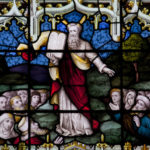We run our website the way we wished the whole internet worked: we provide high quality original content with no ads. We are funded solely by your direct support. Please consider supporting this project.

When God Wears Masks
At various times throughout the OT we find Yahweh assuming the role of a tester, refiner, punisher and even an enemy of Israel (e.g. Jer. 9:7; Lam. 2:5; Isa 63:10). Yet, when we examine these roles, or masks, in the light of the crucified Christ and the broader canonical witness, it becomes clear that these were roles God only reluctantly played.
In Jeremiah, for instance, we find the Lord declaring; “I will refine and test them, for what else can I do because of the sin of my people” (Jer. 9:7). Just as Joseph, out of love for his brothers, temporarily played the role of a harsh task-master over his brothers in order to test them and eventually lead them to repentance (Gen. 42), so God evidently was willing to assume “strange” and “alien” roles whenever doing so would benefit his people in the long run. Or, to draw an analogy from another biblical character, these passages suggest that God, like the apostle Paul, was willing to “become all things to all people” in order to further his purposes in the world (I Cor. 9:22).
Another example of God’s accommodating flexibility concerns the fact that, while OT authors frequently construe Israel’s relationship to Yahweh along the lines of a slave-master relationship, the Lord announced through Hosea that he dreamed of a future time when “you will no longer call me ‘my master’” but would instead “call me ‘my husband’” (Hos. 2:16). The implication, clearly, is that the master-slave relationship was not reflective of God’s true character and will. All divine portraits of Yahweh as a master over slaves must therefore be understood to involve an element of accommodation to the culturally conditioned, wounded and sin-stained way the former slaves he brought out of Egypt were inclined to view him. God was stooping to meet people where they were and to bear their sin in order to eventually bring them to the place he wanted them to be.
Yahweh’s dream for a husband-wife relationship, announced through Hosea, begins to be accomplished in a full way in the kingdom Jesus inaugurated. The Gospels present Jesus as the divine bridegroom who came looking for his bride (Mark 2:19) and the NT depicts all disciples as part of his collective “bride of Christ.” As ancient Jewish bridegrooms frequently did during the interval between the betrothal period and the wedding day, our heavenly bridegroom has gone to “prepare a place for us” (Jn. 14:2). And as betrothed women frequently did as they waited for their bridegroom to return, we who are “the bride” of Christ are to be in the process of making ourselves ready so when he returns, we’ll be a bride “without spot or wrinkle” (Rev 19:7). God’s age-long dream of setting aside the “master” mask and of acquiring a people who see themselves as his spouse rather than his servants is in the process of coming true.
Closely related to this, in Christ we find God setting aside the mask of a harsh “master” in order to relate to his people as a beloved friend. Echoing Yahweh’s words in Hosea 2:16, Jesus tells his disciples,
I no longer call you servants, because servants do not know their master’s business. Instead, I have called you friends, for everything that I learned from my Father I have made known to you (Jn 15:15).
So long as God had to stoop to wear the mask of a “master,” his “business,” as well as his true character, was kept somewhat concealed from his people. But now, in Christ, God has disclosed the heart of his “business”—the “mystery hidden from long ages past” (Rom. 16:25)—and with it, he has disclosed the true nature of his loving, other-oriented character.
Photo credit: Leonorah Beverly via Visualhunt.com / CC BY-NC-SA
Category: General
Tags: Bride of Christ, Character of God, Cruciform Theology
Topics: Attributes and Character
Related Reading

Did God Give Violent Laws? A Response to Paul Copan (#13)
In his critique of Crucifixion of the Warrior God (CWG) at the Evangelical Theological Society annual meeting in November, Paul Copan takes issue with my contention that the violent dimension of OT laws reflects God accommodating the fallen and culturally conditioned perspectives of his people at this time. In my view, God was stooping to…

The Phinehas vs. Jesus Conundrum
I’ll be frank. This is not a blog that will be easy for some people to read. But it’s a blog I believe every follower of Jesus should read – even if you have to force yourself to press on. It’s about something we all wish was not true. It’s about the way the Bible…

The Image of Cross-Like Love: God’s Self-Portrait, Part 6
In the previous blog I argued that God is cross-like love. In this blog I’d like to take this a step further by demonstrating why the cross alone could function as the definitive revelation of God’s true character and by showing how this revelation weaves together everything Jesus was about. If you want to know…

The Bible is NOT the Foundation
Many people imagine that the foundation of their faith is the Bible. This is viewed as the ultimate center around which everything they believe revolves. However, the foundation of the Christian faith is actually centered on a person, not a book. Whereas Islam has always presented itself as a “religion of the book,” the kingdom…

When the Law Demanded the Death Penalty
The Sinai covenant is significantly structured around violence. It motivates behavioral conformity by promising rewards and threatening violence. Without the threat of violence, the law looses its “teeth.” If the law is an acquiescence to sin, then the divinely sanctioned violence that is associated with it must also be considered an acquiescence to sin. The…

When God Endorsed Polygamy
We often find God acting as if he supports things we know, by other means, that he does not. For example, though his ideal was monogamy, it’s clear in the biblical narrative that, once God decided to permit men to acquire multiple wives and concubines, he was not above bearing the sin of his people…
